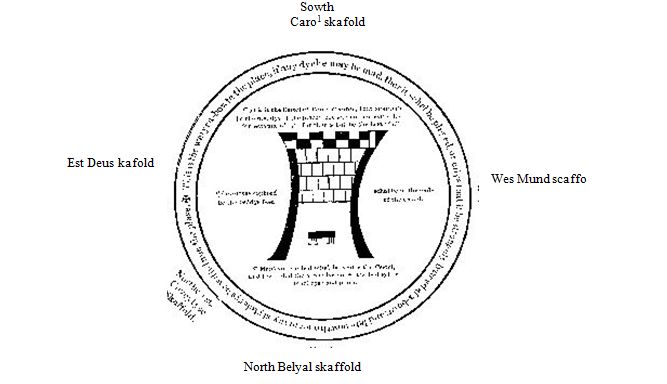

| HUMANUS GENUS Aftyr oure forme-faderys kende žis nyth I was of my modyr born. Fro my modyr I walke, I wende, Ful feynt and febyl I fare 3ou beforn. I am nakyd of lym and lende As Mankynde is schapyn and schorn. I not wedyr to gon ne to lende To helpe myself mydday nyn morn. For schame I stonde and schende. I was born žis nyth in blody ble And nakyd I am, as 3e may se. A, Lord God in trinite, Whow Mankende is vnthende! To aungels bene asynyd to me: že ton techyth me to goode; On my ryth syde 3e may hym se; He cam fro Criste žat deyed on rode. Anožyr is ordeynyd her to be žat is my foo, be fen and flode; He is about in euery degre To drawe me to žo dewylys wode žat in helle be thycke. Swyche to hath euery man on lyue To rewlyn hym and hys wyttys fyue. Whanne man doth ewyl, že ton wolde schryue, že tothyr drawyth to wycke. But syn žese aungelys be to me falle, Lord Jhesu, to 3ou I bydde a bone žat I may folwe, be strete and stalle, že aungyl žat cam fro heuene trone. Now, Lord Jesu in heuene halle, Here whane I make my mone. Coryows Criste, to 3ou I calle. As a grysly gost I grucche and grone, I wene, ryth ful of thowth. A, Lord Jhesu, wedyr may I goo? A crysme I haue and no moo. Alas, men may be wondyr woo Whanne žei be fyrst forth browth. |
MANKIND After our forefathers' kind, This night I was of my mother born. From my mother I walk, I wend. Full faint and feeble I fare you beforn. I am naked of limb and lend, lend = loin As all mankind is shapčd and shorn. I know not how 'twere best I fared, Nor what to do at noon or morn, For shame I stopped and stared. I was born this night in bloody blee, blee = hue And naked I am, as ye may see. Ah, Lord God in Trinity, Mankind is ill-prepared! (TWO ANGELS enter.) Two angels been assigned to me, The one teacheth me the good; On my right side ye may [her] see, (I changed the word from "him" to "her" since our good angel is a woman, Helena.) She came from Christ that died on rood. rood = Jesus' cross Another is ordainčd here to be, That is my foe by fen and flood. He goes about in every degree To drag me to those devils wood wood = enraged, insane That are thick in the evil dell. Such two hath every man alive, To rule over him and his wits five. When man does evil, the one would shrive, shrive = hear his confession (and absolve him) T'other drags him to hell. wycke = wicked, wickedness But since these angels to me befall, Lord Jesu! of you I beg a boon: That I may follow, by street and stall, by street and stall = everywhere and always The angel that came from heaven's throne. Now, Lord Jesu, in heaven's hall Hear when I make my moan. Caring Christ, to you I call! Like a grisly ghost, I grieve and groan, And ponder, right full of thought. Ah, Lord Jesu! Whither may I go? A christening-cloth I have and no moe. I do not know whether crysme is the name of the ritual or the baby's garment. Alas! men may be wonder woe, When they be first forth brought. (Lines 275-326) |